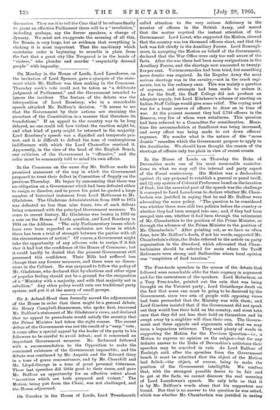-In the Commons on the same day Mr. Balfour made
his promised statement of the way in which the Government proposed to treat their defeat in Committee of Supply on the previous Thursday. He began by announcing that there was no obligation on a Government which had been defeated either to resign or dissolve, and to prove his point he quoted a large number of historical instances from Lord Melbourne to Mr. Gladstone. The Gladstone Administration from 1868 to 1874 was defeated no less than nine times, two of such defeats being concerned with the principal Government measure. To come to recent history, Mr. Gladstone was beaten in 1893 on a vote on the House of Lords question, and Lord Rosebery in 1894 on the Address. "The only Parliamentary issues which have ever been regarded as conclusive are those in which there has been a trial of strength between the parties with all the circumstances of notice." Of course, a Government might take the opportunity of any adverse vote to resign if it felt that it bad lost the confidence of the House of Commons ; but it could hardly be denied that the present Government still possessed this confidence. Their Bills had suffered leas change than any former measures, and there were no dissen- sions in the Cabinet. He was prepared to follow the policy of Mr. Gladstone, who declared that by-elections and other signs of popular feeling should not be a ground for the resignation of a "Ministry with a majority, and with that majority not in rebellion." Any other policy would ruin our traditional party system, and put it at the mercy of small groups.






































 Previous page
Previous page